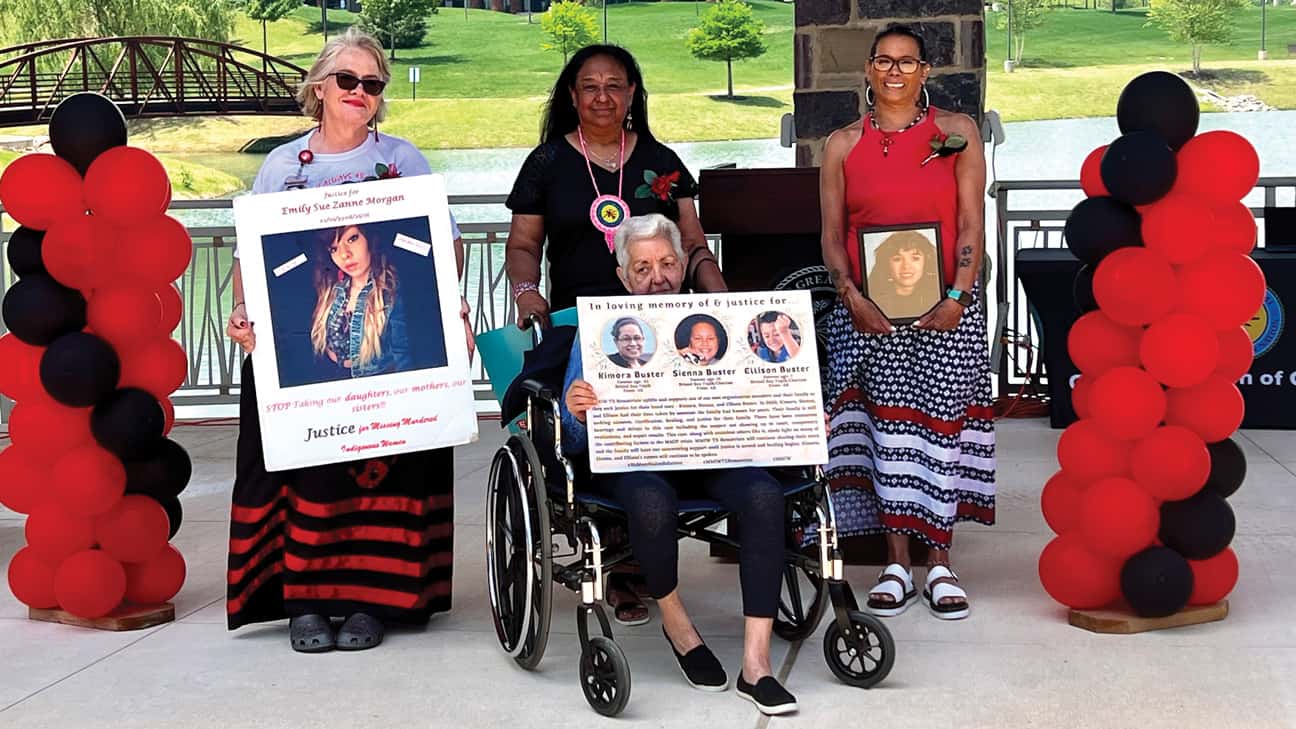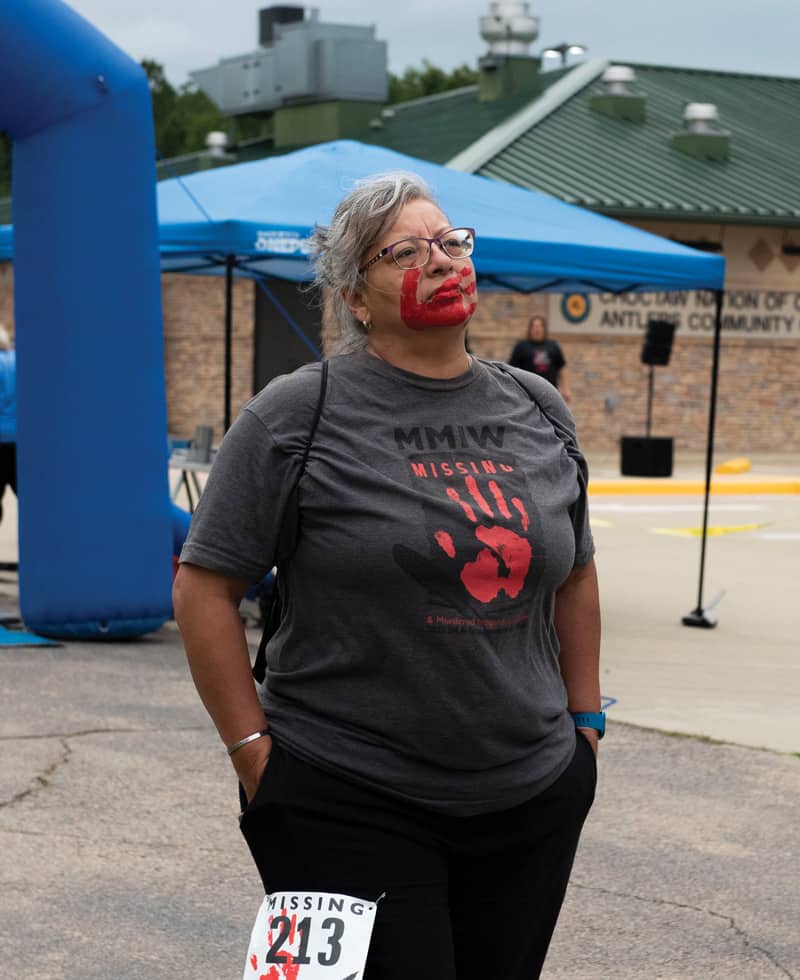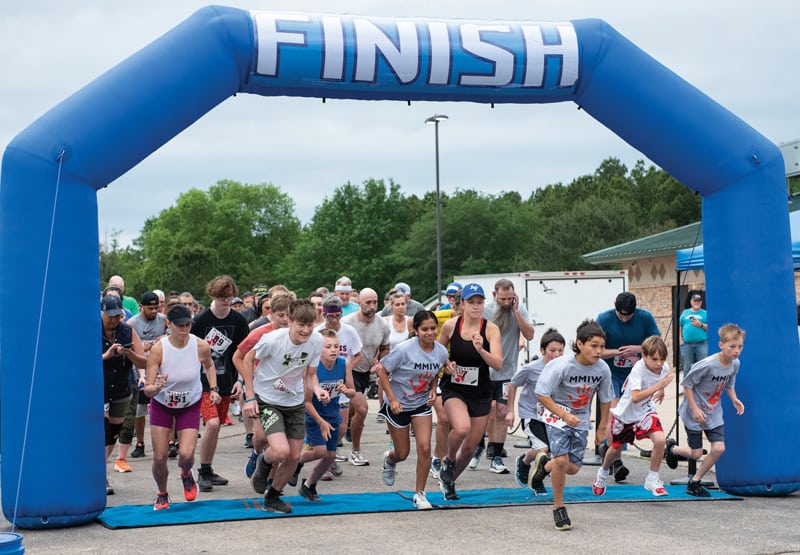
Families hold photos of their murdred and missing loved ones after the May 5 MMIW event at the Choctaw Nation Tribal Headquarters.
Missing and Murdered Indigenous Peoples Update
Published June 1, 2023By Kendra Germany-Wall and Christian Chaney
President Joe Biden proclaimed May 5, 2023, as Missing or Murdered Indigenous Persons Awareness Day.
For the past few years, the Biskinik has updated its readers on the issue of Missing and Murdered Indigenous Peoples Movement. Here is the update for 2023.
National Statistics and Awareness
According to the most recent report released by the Centers for Disease Control, murder is the sixth leading cause of death for Indigenous women and girls between the ages of 1 and 44 in the U.S.
Also, a National Institute of Justice (NIJ) Research Report released in 2016 found that 4 out of 5 Indigenous women have experienced violence in their lifetime and more than half have experienced sexual violence.
Women aren’t the only ones in the Indigenous community who experience violence at alarming rates, as more than 1.4 million American Indian and Alaska Native men have experienced violence in their lifetime, according to the NIJ report.
While violence against Indigenous women and men is underreported, concrete statistics on violence against trans and Two-Spirit members of the Indigenous community is even harder to find.
According to research by the Transgender Law Center, since 1990, there have been at least 25 transgender and Two-Spirit Indigenous people killed or missing.
“The lack of reporting and knowledge about the plight of trans and Two-Spirit people in Native communities is one way that violence persists in such communities,” states the Transgender Law Center on their website.
In recent years, the issue of MMIP has emerged from the shadows thanks to the hard work and activism of individuals and organizations demanding action on the issue.

Many of the event’s participants wore red handprints over their mouths, symbolizing all the missing Indigenous sisters whose voices are not heard.

On your mark, get set, go. Runners cross the finish line during the May 13 MMIW 5k in Antlers, Oklahoma.
In 2021, Secretary Deb Haaland announced the formation of a new Missing & Murdered Unit (MMU) within the Bureau of Indian Affairs Office of Justice Services (BIA-OJS) to provide leadership and direction for cross-departmental and interagency work involving missing and murdered American Indians and Alaska Natives.
At the time of the announcement, approximately 1,500 American Indian and Alaska Native missing persons had been entered into the National Crime Information Center throughout the U.S. and about 2,700 cases of murder and nonnegligent homicide offenses had been reported to the Federal Government’s Uniform Crime Reporting Program.
Investigations often remain unsolved due to a lack of investigative resources available to identify new information from witness testimony, re-examine new or retained material evidence and review fresh activities of suspects. The MMU works with Tribal, BIA and FBI Investigators on active Missing and Murdered investigations and enables the department to expand its collaborative efforts with other agencies, such as working to enhance the DOJ’s National Missing and Unidentified Persons System (NamUs).
In December 2021, the Bureau of Indian Affairs announced the launch of its new website dedicated to solving missing and murdered cases in Indian Country.
The site provides detailed case information and pathways to submit tips and other information that may help investigators with the detection or investigation of an offense committed in Indian Country.
For some tips, the BIA offers rewards of up to $5,000 for information assisting in the detection or investigation of an offense committed in Indian country or in the arrest of an offender against the United States.
Visit bia.gov/service/mmu for more information.
CNO Brings Awareness to MMIP
The MMIW Chahta organization hosted an event honoring MMIP and their families on May 5 at the Choctaw Nation’s Headquarters. Several individuals spoke on behalf of their loved ones.
Kimora, Elison and Sienna Buster
In November 2020, Kimora Buster (Bristol Bay Yupik), 43, was shot and killed in the basement of her Anchorage, Alaska home, along with two of her children, Ellison Buster (Bristol Bay Yupik/Choctaw), 7 and Sienna Buster (Bristol Bay Yupik/Choctaw), 10.
Kimora’s nephew, Cody Roehl (Bristol Bay Yupik), 18, was also murdered in another location.
A third child survived the attack.
Malachi Maxon, also Kimora’s nephew, carried out the horrific killings. Maxon had been staying with the Busters following his release from prison a week earlier.
Kimora’s mother-in-law, Beverly Richardson, shared her family’s tragic story at the event.
“I urge all of you to cherish your loved ones and hold them close. Life is precious and fleeting and we never know when we may lose those we hold dearest. As we continue to mourn the loss of my family, I ask for prayers for me, my son and the remaining child. Together, we can honor the memory of others and bring strength to our Choctaw community.”
Dawn Mechelle Nakedhead (Kirk)
Dawn Nakedhead (Kirk) went missing at 16 and was last seen on October 18, 1991, at a Phillips 66 station in Fort Gibson, Oklahoma.
Dawn went to spend the night with a friend. They planned to attend a football game and then return home. She was last seen using a payphone at the convenience store and never returned home.
Dawn (Cherokee) has black hair, brown eyes, a scar on her left elbow and a purple/black birthmark on both sides of the nape of her neck.
Her sister, Brandy Christie, spoke about her case.
“My heart aches today just as much today as it did on October 18; when my sister came up missing. I cannot describe to you the feeling of deep sadness that overwhelmed me. Knowing that my sister could still be out there, the unknown is scary and at this point, we just pray for answers,” said Christie. “I know that I will never stop fighting to find her and what a beautiful feeling it would be to wrap my arms around her the day she is found. If you or anyone you know has any information regarding the whereabouts of my sister please contact me.”
Emily Morgan
On August 26, 2016, 23-year-old Emily Morgan and her friend, 24-year-old Totinika Elix, were found murdered just outside of McAlester, Oklahoma, in the small community of Bache.
Emily was a 23-year-old mother to one son. She was a competitive athlete, a part-time model and a former District 4 Choctaw Princess.
Emily’s mother, Kim Merryman, shared her story with the crowd during the May 5 event, sharing details from her case and how her death has affected her entire family.
“It doesn’t matter how many years it’s been, she’s my baby. She grew inside of me and somebody made the choice to put a gun to her head, her pretty little head. Everything she ever did was about the way she looked and they ruined that for her,” said Merryman. “They took her life, they took her from me, they took her from her sister, they took her from her niece and most of all they took her from her son. My daughter didn’t know the statistics then, I didn’t know the statistics then. I didn’t know that she was more likely to die from murder than she was in a traffic accident and she drove crazy.”
Everyone who spoke during the event shared the importance of receiving justice for their loved ones.
“The only way that we are ever going to get justice is if we stand united and we stand aware,” said Merryman.
President and Founder of Missing Murdered Indigenous Women-Chahta, Karissa Hodge, started the organization with the primary goal of helping families with tragedy, bringing awareness to the community and educating the public.
According to MMIW-Chahta Vice-Chair MK Wilhite, events like the one on May 5 are essential in getting the issue’s importance across to the public.
“You can read about it all day long, but if you have those families sitting there telling you what happened and how it still makes them feel, it just makes it more personable, and it’s good for everyone, for the families to come and speak and have their time,” Wilhite said.
The Second Annual Missing and Murdered Indigenous Women 5k took place on May 13 in Antlers, Oklahoma.
Hannah Wood, who hosts the iLead Program partnered with Project EMPOWER, Choctaw Nation’s Domestic Violence Outreach program, to host the MMIW 5k.
Wood says the event’s purpose is to “raise awareness for our murdered and missing indigenous women in our area,” She was thrilled by the turnout for the event. By April 20, 386 participants had pre-registered for the race.
MMIP in Oklahoma
According to a 2020 study by the Sovereign Bodies Institute, Oklahoma had over 200 missing and murdered Indigenous women, with an average of 18 new cases a year and over 150 cases of missing and murdered Indigenous men.
The state could soon see an alert system for when adults go missing under unusual circumstances later this year. In 2016, Kasey Russell, a 29-year-old Cherokee man from Tahlequah, Oklahoma, was reported missing.
According to police records, he was last seen on June 27, 2016, leaving the Seminole Nation Casino with his girlfriend and an unknown man. The circumstances surrounding his disappearance were unusual, as Kasey was known to be very close with his family and communicate with them frequently. Annetta Russell, Kasey’s mother, immediately knew something had happened to her son when she did not hear from him. In a recent interview with The Oklahoman, Annetta said she “felt like they just brushed him under the rug” after contacting police departments for help locating her son.
After six long years, federal agents from the unit in the Bureau of Indian Affairs were finally able to locate Kasey Russell’s remains in a shallow grave less than a quarter of a mile from where he was last reported to have been seen. His death is still under investigation.
Annetta Russell is determined to make a change and shed light on the crisis of murdered and missing indigenous people so other families do not experience the same barriers she faced when looking for her son.
The proposed alert system, named after Kasey, is intended to create a system that applies to all adults but triggers police to share extra information when Native American adults go missing, according to The Oklahoman.
House Bill 1077 would alert the public about the person and their disappearance, including details and information on contacting tribal authorities if the person is Native American. The Senate is currently considering the proposal.
At the time of publication, Oklahoma’s governor Stitt hadn’t decided on Kasey’s bill. However, he has vetoed over 20 bills, including some that would have positively impacted Native American tribes in the state.
Available Services
CNO offers several services to those affected by domestic violence and abuse.
Tribal Victim Services guides victims of crime and their families with counseling and group therapy. This program consists of a Victim Advocate and a Licensed Professional Counselor (LPC) who provide comprehensive, culturally competent, direct services to victims of crime and their families.
Project EMPOWER assists victims of domestic violence, dating violence, sexual assault and stalking by helping them stabilize housing, childcare and other day-to-day support so they can focus on reclaiming their lives.
For more information about the CNO programs mentioned above, call 877-285-6893.
Family Violence Prevention provides specialized services and resources that promote family strengths and stability and enhance the safety of victims of domestic violence, family violence or dating violence and their dependents.
Choctaw Children and Family Services is ready to help anyone experiencing domestic violence. If you or someone you know is a victim of family violence or you’re living in fear of violence, call 800-522-6170.
Other useful contacts include:
- Oklahoma Safeline – 800-522-7233 (SAFE)
- National Domestic Violence Hotline – 800-799-7233 (SAFE)
- Rape, Abuse & Incest National Network Hotline – 800-656-4673 (HOPE)
- Communication Services for the Deaf – 800-252-1017 (TTY) / 866-845-7445 (Voice)
- Okla Coalition Against Domestic Violence & Sexual Assault (Monday-Friday, 9 a.m.- 5 p.m.) – 405-524-0770
- Stronghearts Helpline – 844-762-8483 (1-844-7NATIVE)
- Missing Murdered Indigenous Women-Chahta – 580-740-2351, [email protected], Facebook, Instagram or Twitter
Even though all of the progress is a step in the right direction for activists and families, there is still much left to do to address this issue correctly.
The National Indigenous Women’s Resource Center offers resources and ways to get involved in the MMIW movement and information on other Indigenous Women’s Issues.
Visit www.niwrc.org for more information.